After the Silence
April 09, 2018
it is finished. i have done what needed to be done. say hello to post-enlightenment dk
...if only it were that easy, eh?
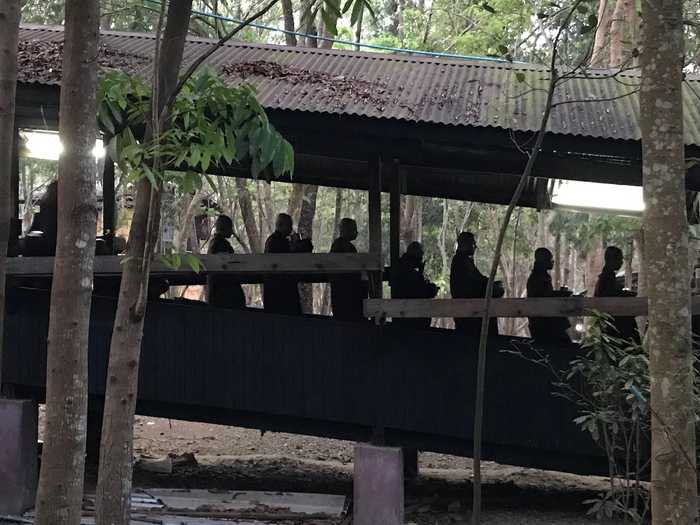
i just completed around 3 weeks of meditation at the pa auk meditation center in myanmar, and there's a lot i want to say so i'll split this up into two sections: "meditation" for notes about my practice and "daily life" for everything else
meditation
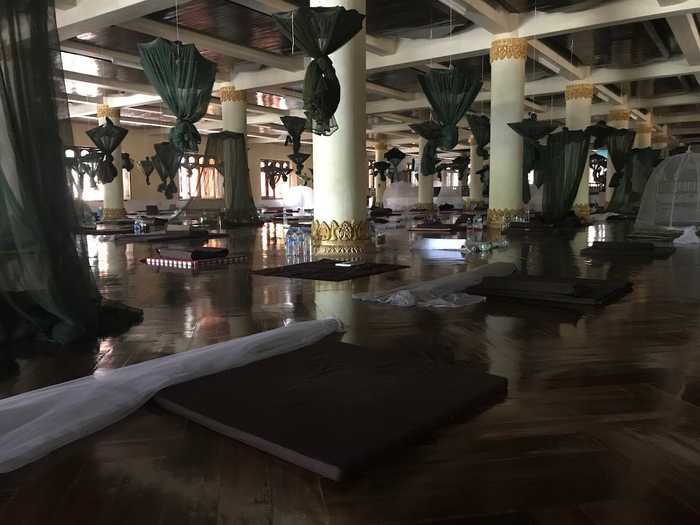
i continued using the mind illuminated (TMI) to guide my practice there and my appreciation for the book has only deepened. i can't stress enough how amazing this book is for helping you skillfully progress in meditation. some traditions and teachers eschew the idea of progress and will say that there is nothing to achieve and the desire to progress only leads to more grasping. that's a valid approach as well, but at this season of my practice i've personally found having pointers for what to focus on depending on my level of skill to be tremendously helpful.
during my stay at pa auk, i hit TMI stage 7 a few times, which corresponds to a state where your attention is extremely sharp, completely stable on the breath, and distractions stop arising. when we first start meditating, we constantly get lost in thought and it's hard to imagine staying with the breath without getting distracted -- this stage is where your mind becomes so unified on the breath that it's all there is. thoughts largely stop arising and when they do, they feel like tiny whispers rather than loud neon signs. it's a really pristine state and it's around this stage that i started to have some interesting experiences
for the longest time, i didn't know what to make of people talking about bodily energies. things like chi, chakra, and kundalini seemed like obvious pseudosciences to me. but when my attention deepened and i directed it toward my body, i got a firsthand experience of what these systems describe. i first started noticing subtle pressure that alternated along with my breath and eventually, it felt like my entire body was breathing. if i watched my forearm, i could notice it expanding and contracting, as if from within, synchronized with my breath. it's a really neat/weird experience and i think this might be one of the reasons why the 10-day goenka vipassana retreats are so popular -- because they focus largely on body scanning, a lot of people probably discover that they can connect with their bodies in ways they didn't know was possible. on a separate occasion, i felt two circles of tingling sensations move up my spine, go back down, go up the sides of my torso, go back down, and then go up to the middle of my back before getting stuck there. as soon as i straightened by back, it started moving again up the spine to the base of the neck. it was as if it had a mind of its own, and "energy" seems like an apt way to describe it. to be clear though, i don't believe that "energy" actually corresponds with anything physical within the body (vs. being fabrications of the mind) and it's unclear why it would have applications for medicine (e.g. acupuncture, energy healing). what i do know now is that it's very much possible to have a subjective experience of energy coursing through the body and that the mind and body are connected in surprising and powerful ways. in addition to the energetic phenomena, other things happened as well: glowing white lights, tingling sensations building up on my body and then exploding, my body feeling like it was tilted over completely even though i was sitting up straight, etc.
at pa auk, the goal of developing powerful concentration is to enter special states of absorption called jhanas. basically, a light appears, you fuse with it, and you enter an extremely blissful state of consciousness. my concentration didn't get strong enough for me to experience this, and since concentration is much easier to develop in a retreat setting than in daily life, i think it'll be a while before i can try again.
some of you might be wondering what the point of all this is. why develop strong concentration and enter these states? the idea is that you develop strong concentration so that you can use your tranquil mind to inspect reality and have insights that lead to awakening/enlightenment. although they're very attractive, the blissful states are not the ultimate goal -- they're simply a means to calm the mind in order for your insight meditation to be more effective. my plan is to continue developing my concentration using TMI until the 3-month retreat in september, where i'll switch over to insight meditation.
one of the outcomes of concentration-focused meditation is to purify the mind. a mind that's craving, hateful, restless, sleepy, or doubtful is not conducive to deep tranquility, and it was illuminating to note what kind of thoughts were most distracting. i noticed that there was one theme that showed up again and again: remorse. memories and names of people who i had wronged over the years kept appearing and it was surprising just how much came up. i realized that i was still holding onto these things and i'm planning to send belated apologies to the people i had hurt. even if i lose all the concentration i had built up at this retreat, this realization alone would make my time there well spent.
daily life
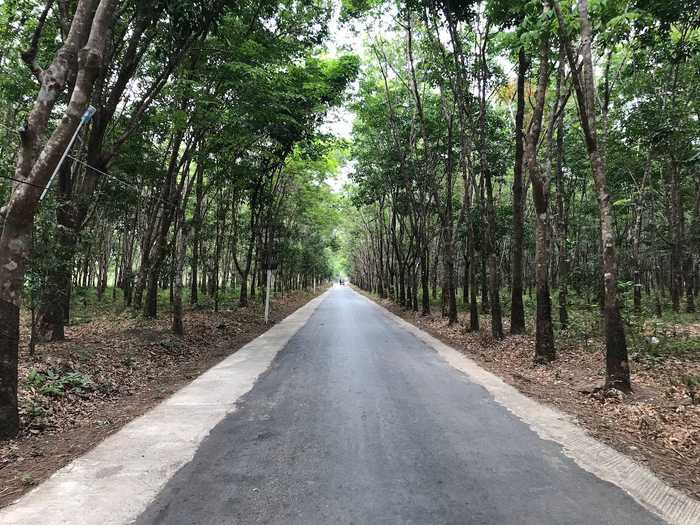
now for everything else off the cushion! i'll give snapshots of life at the monastery through the training rules you undertake to help facilitate practice — the eight precepts:
1. I undertake the precept to refrain from the destruction of life (including insects)
the best part about this precept: all the food is vegetarian (usually vegan) the worst part about this precept: living in terror of mosquitoes because you can't kill them
i have to confess though: i accidentally squashed a few ants trying to get them off me while sleeping
the animals have definitely caught on to the fact that they can do whatever they want because one of the dogs bit me and i was rushed to the local clinic to get an anti-rabies vaccine. when i arrived, they told me to go clean the wound which i learned meant buying bottled water from a vendor across the street and pouring it on top. they probably figured the antibiotics i'd be taking would be sufficient to prevent an infection but it was still hilariously unreal
2. I undertake the precept to refrain from taking what is not given
yeah, it's pretty easy not to steal stuff esp. when you're in a monastery in the middle of a forest. what are you going to take -- a monk's robes?
3. I undertake the precept to refrain from sexual activity
i wasn't sure whether to ask the monk that i registered with whether this included masturbation but i decided not to do it during my time there. and it was surprisingly super easy. sexual urges came up 3 or 4 times total and all i had to do was simply notice it arise and let it go. i was really struck by how nice it felt to be so unaffected by one's sexual urges and it was a stark contrast to the way that sexual desires tend to cloud your judgment and make you succumb to them. i'm not sure whether to try for all sexual relations or just masturbation, but i want to continue refraining for a while and become more skillful in dealing with sexual desires. oh wait is this how you end up celibate
4. I undertake the precept to refrain from untrue speech
in most retreat settings, this precept takes the form of noble silence where you refrain from talking entirely. that was how i wanted to practice because complete silence makes it easier to cultivate and maintain concentration, but unfortunately the main pa auk center isn't the best for that. a lot of the other foreign yogis and the monks will talk to you and it's hard to turn them down when they're being warm and friendly. i ended up meeting some really great people as a result, but i think i'll choose a smaller center where it's easier to maintain silence the next time i do an extended retreat of this sort
5. I undertake the precept to refrain from the use of wine, liquors, and other intoxicants (including recreational drugs)
over the past year or so, i've noticed that my desires to drink alcohol and smoke weed have decreased significantly. at this point, i feel pretty comfortable letting them go entirely. will be interesting to see how this affects my social interactions given how ingrained these are in our society, but i think it'll be worth it. not sure how i feel about also dropping psychedelics and substances like mdma -- they've been immensely beneficial (wouldn't be meditating today without my experiences with them) but at the same time, i feel like i've gotten what i needed to out of them
6. I undertake the precept to refrain from eating after midday
i don't know why this rule exists but as a result, breakfast happens at 5AM and lunch at 10:30AM. that means if you're interested in trying intermittent fasting, you should stay at a monastery for a while because you'll have a 17 hour fasting period every day.
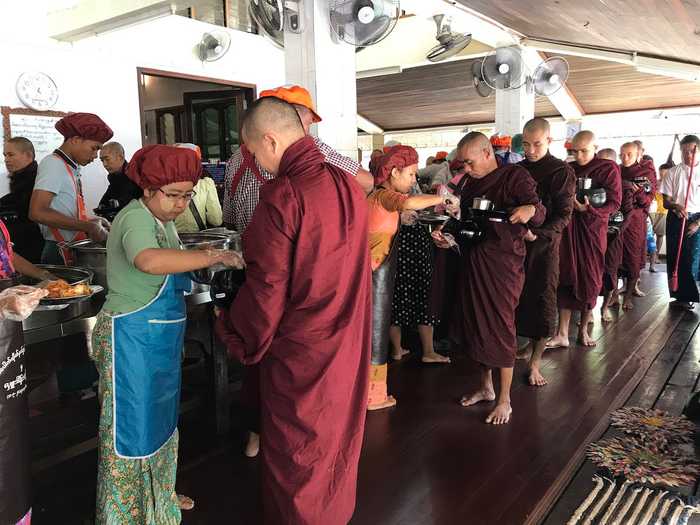
i really loved the food at pa auk except for the fact that i had digestive problems my entire stay there. getting meals is quite a touching experience -- the local villagers dedicate a lot of time preparing the food and serving you. families show up all the time to offer things like bottles of water and even ice cream. one time this guy placed a single razor blade next to all my food and i was quite alarmed and confused until i realized that shaved heads don't just happen automatically. myanmar is largely buddhist (~90%) and it's quite neat to see a culture where local communities entirely support men and women who have devoted their lives to spiritual development.
7. I undertake the precept to refrain from dancing, singing, music, shows, all form of entertainments, and from bodily adornment -- the use of jewelry, perfumes, and cosmetics
i didn't have data on my phone, so i couldn't listen to music or watch videos even if i wanted to. apart from the meditation component, i think silent retreats are extremely powerful because they create an environment where (1) you have no choice but to confront your own mind and (2) you realize just how much we seek distractions, especially from our phones. it makes you especially sensitive to forms of entertainment that can be pretty mindless like scrolling through facebook or instagram.
i'm guessing the rule about bodily adornments is about avoiding solidifying a sense of self. there aren't many mirrors at pa auk, and there really aren't any reasons to look at one. as a result, i had the startling experience of rediscovering what i looked like when i came across a mirror after not having looked at myself for a long time. it was in that act of re-identification with things like ethnicity, gender, looks, height, weight, etc. that i realized how nice it was to not be attached to those things.
8. I undertake the precept to refrain from lying on a high or large (luxurious) beds
ah, accommodations. when you arrive, you get assigned a kuti, which is like a 10' x 10' shack.
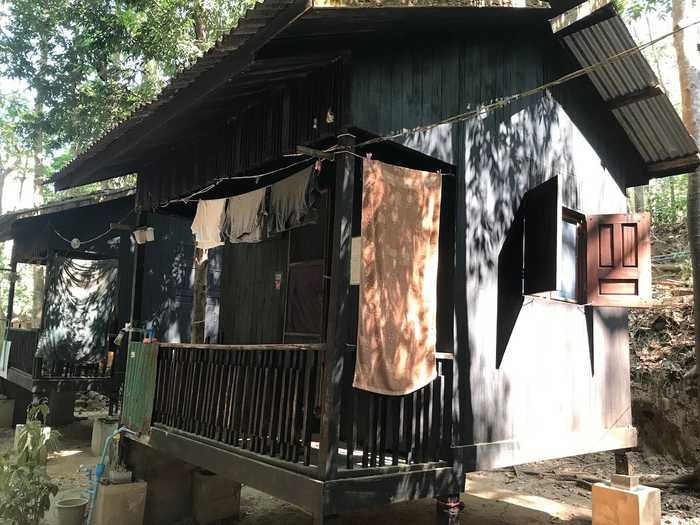
and the non-luxurious bed? literally just a bed frame.
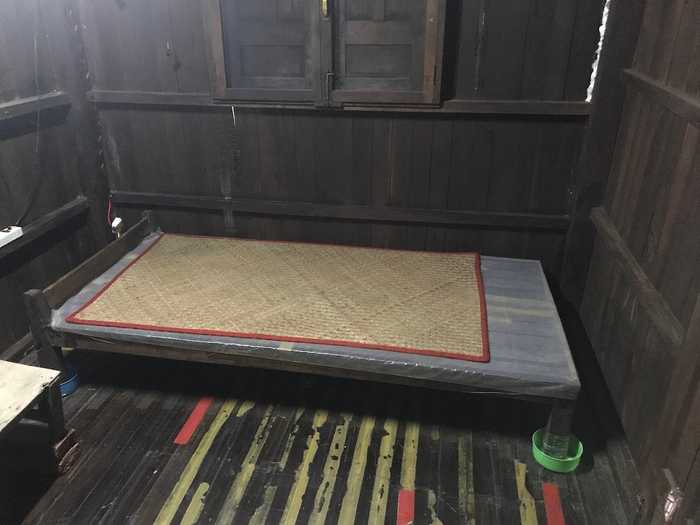
this was perhaps the first time i couldn't sleep because the bed was applying too much pressure to my tailbone. people often talk about how they find they need to sleep much less on meditation retreats, but i had the complete opposite experience. i had to sleep 9 to 10 hours a night to feel rested and it's probably because i was waking up multiple times in the middle of the night. i thought that sleeping on a japanese futon on the floor was pretty austere but this was next level.
concluding thoughts
my experience at pa auk confirmed that theravada buddhist meditation really resonates with me -- if i had to choose a single practice for the next several years, samatha-vipassana (tranquility-insight) meditation would be it. it's rational, systematic, and progress seems to come quickly with dedicated practice. that said, i believe that there are many authentic paths to awakening, and i want to make sure i've also explored what other traditions have to offer. one of these is advaita vedanta, a hindu tradition that is quite different from the theravada buddhist approach: instead of developing concentration and then applying that to have many insights that culminate in the insight into no-self, advaita vedanta has a much more direct approach of pointing directly to the no-self (or true self) teaching. i'll be off to india tomorrow to stay at an ashram with a guru for 10 days, and then you'll probably get another email from me then. wishing you all the best in life and in your own practice!
dk